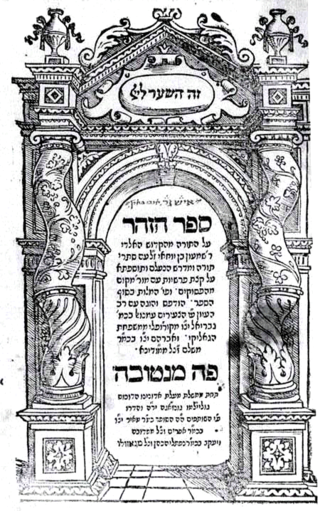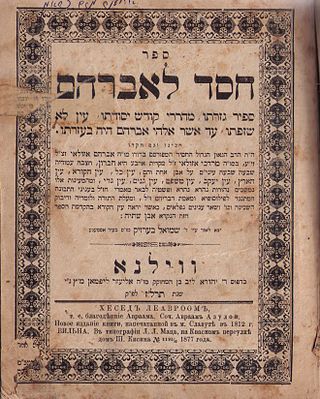Related Research Articles

The Zohar is a foundational work in the literature of Jewish mystical thought known as Kabbalah. It is a group of books including commentary on the mystical aspects of the Torah and scriptural interpretations as well as material on mysticism, mythical cosmogony, and mystical psychology. The Zohar contains discussions of the nature of God, the origin and structure of the universe, the nature of souls, redemption, the relationship of Ego to Darkness and "true self" to "The Light of God".

Isaac ben Solomon Luria Ashkenazi, commonly known in Jewish religious circles as "Ha'ARI", "Ha'ARI Hakadosh" or "ARIZaL", was a leading rabbi and Jewish mystic in the community of Safed in the Galilee region of Ottoman Syria, now Israel. He is considered the father of contemporary Kabbalah, his teachings being referred to as Lurianic Kabbalah. While his direct literary contribution to the Kabbalistic school of Safed was extremely minute, his spiritual fame led to their veneration and the acceptance of his authority. The works of his disciples compiled his oral teachings into writing. Every custom of Luria was scrutinized, and many were accepted, even against previous practice.

Isaac Israeli ben Solomon, also known as Isaac Israeli the Elder and Isaac Judaeus, was one of the foremost Jewish physicians and philosophers living in the Arab world of his time. He is regarded as the father of medieval Jewish Neoplatonism. His works, all written in Arabic and subsequently translated into Hebrew, Latin and Spanish, entered the medical curriculum of the early thirteenth-century universities in Medieval Europe and remained popular throughout the Middle Ages.
Nissim ben Jacob, was a rabbi best known today for his Talmudic commentary ha-Mafteach, by which title he is also known.
Moshe haDarshan was chief of the yeshiva of Narbonne, and perhaps the founder of Jewish exegetical studies in France. Along with Rashi, his writings are often cited as the first extant writings in Zarphatic, the Judæo-French language.
Zerachiah ben Isaac ha-Levi Gerondi, called the ReZaH, RaZBI or Baal Ha-Maor was born about 1115 in the town of Gerona, Catalonia, Spain – hence the name Gerondi – and died after 1186 in Lunel. He was a famous rabbi, Torah and Talmud commentator and a poet.
Meir ben Judah Leib Poppers or Meir ben Judah Loeb Ha-Kohen Ashkenazi Poppers was a Bohemian rabbi and kabbalist. He was born in Prague and died in Jerusalem in February or March, 1662.
Isaac ben Samuel the Elder, also known as the Ri ha-Zaken, was a French tosafist and Biblical commentator. He flourished at Ramerupt and Dampierre, France in the twelfth century. He is the father of Elhanan ben Isaac of Dampierre.
Abraham ben Isaac of Narbonne (c. 1080-85 – 1158) was a Provençal rabbi, also known as Raavad II, and author of the halachic work Ha-Eshkol. He was also the first Jewish ambassador to France. He was appointed by Charlemagne in 797. He headed the embassy sent in 797 by Charlemagne to the Caliph of Baghdad, Haroun ar-Rachid, to secure his military cooperation against their common enemy, the Umayyad dynasty. He brought gifts from Charlemagne, a pack of hunting dogs and racing horses.
Joseph ben Abraham Gikatilla was a Spanish kabbalist, student of Abraham Abulafia.
Shem Tov ibn Shem Tov was a Spanish kabbalist and fierce opponent of rationalistic philosophy.
Isaac ben Samuel of Acre was a Jewish kabbalist who fled to Spain.
Shem Tov ben Abraham ibn Gaon was a Spanish Talmudist and kabbalist.

Abraham ben Mordecai Azulai was a Kabbalistic author and commentator born in Fez, Morocco. In 1599 he moved to Ottoman Palestine and settled in Hebron.

Christian Knorr von Rosenroth was a German Christian Hebraist and Christian Cabalist born at Alt-Raudten in Silesia. After having completed his studies in the universities of Wittenberg and Leipzig, he traveled through the Netherlands, France, and England. At Amsterdam, he became acquainted with an Armenian prince, with the chief Rabbi, Meier Stern, Dr. John Lightfoot and Henry More. Influenced by them, and others, he studied Oriental languages, chemistry, and the cabalistic sciences. On his return, he settled at Sulzbach where he became the privy counsellor of Christian Augustus, Count Palatine of Sulzbach. He devoted himself to the study of Hebrew. Later he became a student of the Kabbalah, in which he believed to find proofs of the doctrines of Christianity.
Judah ben Barzillai (Albargeloni) was a Catalan Talmudist of the end of the 11th and the beginning of the 12th century. Almost nothing is known of his life. He came of a very distinguished family, on account of which he was not seldom called "ha-Nasi", a title of honor borne also by his descendants in Barcelona.
The primary texts of Kabbalah were allegedly once part of an ongoing oral tradition. The written texts are obscure and difficult for readers who are unfamiliar with Jewish spirituality which assumes extensive knowledge of the Tanakh, Midrash and halakha.
Shalom Ben Moses Buzaglo was a Moroccan kabbalist born in Marrakesh and filled the position of dayyan. Owing to voyages in the Orient made in his capacity of collector of alms for the relief of the poor in Palestine, he became acquainted with the chief Kabbalists of the period. He also visited Europe, and sojourned for some time in London. He was tortured by the Sultan and left for England in 1745, where he remained until his death.
Berit Menuchah is a practical Kabbalah work written in the 14th century, by Rabbi Abraham ben Isaac of Granada. It consists of a system of theurgy which uses secret names of God and his emanations for spiritual and magical purposes. An English translation thereof was published in 2007.
References
 This article incorporates text from a publication now in the public domain : Singer, Isidore; et al., eds. (1901–1906). "Abraham ben Isaac of Granada". The Jewish Encyclopedia . New York: Funk & Wagnalls.
This article incorporates text from a publication now in the public domain : Singer, Isidore; et al., eds. (1901–1906). "Abraham ben Isaac of Granada". The Jewish Encyclopedia . New York: Funk & Wagnalls.